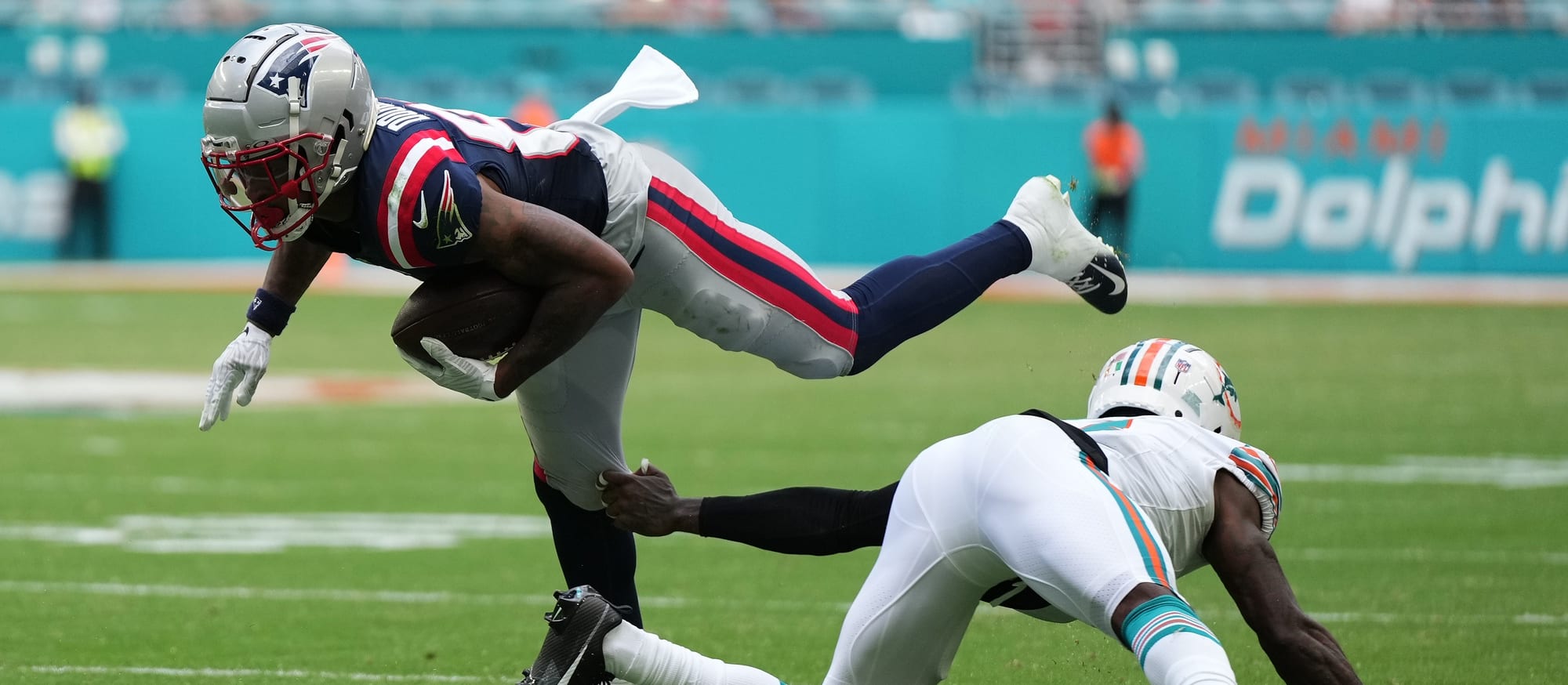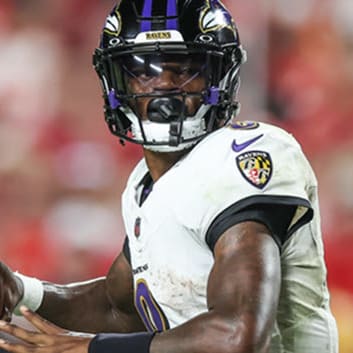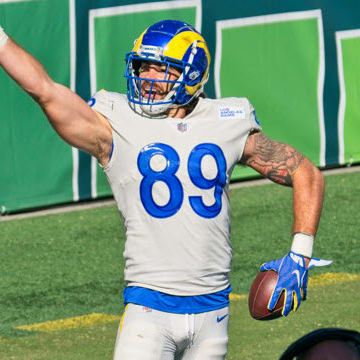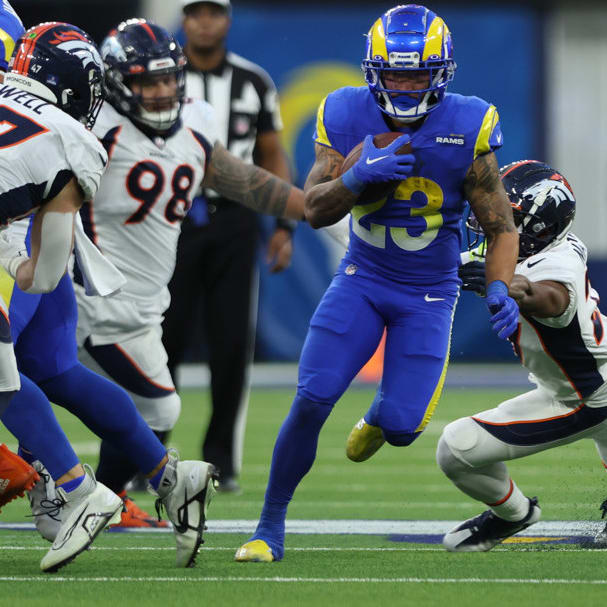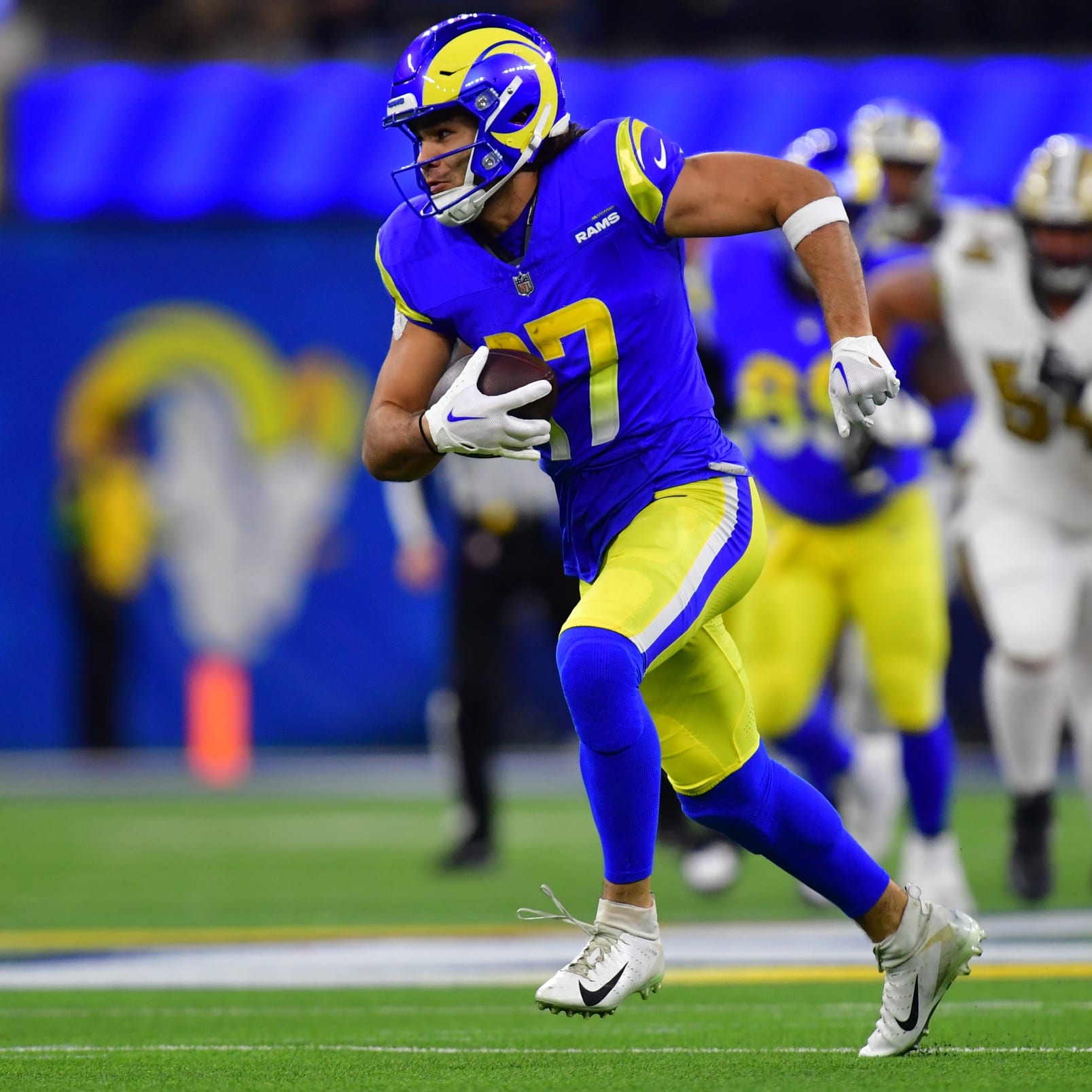This article is part of our Training Camp Notes series.
We've reached that beautiful part of summer when NFL beat writers inundate us with tweets and articles from training camp, causing fantasy players to rethink some of what we thought we knew. I've written a lot of RotoWire's summertime player notes for about a decade now, which hopefully gives me a pretty good idea of what ultimately matters and what doesn't. The truly useless stuff from twitter and articles doesn't get relayed to readers in the first place, but that doesn't mean everything that is worthy of a player note is grounds for rethinking valuations/projections/rankings.
Many of the notes we write contain information that's helpful to keep in mind but not necessarily worth acting on, and some of the notes are primarily written to provide updates on guys we haven't heard from or discussed since the end of the following season (or very early in the offseason). That said, there's also some stuff coming through from beat writers that can genuinely change opinions/projections.
Below I'll share my top seven tips for sorting through player notes and tweets from training camp to figure out what really matters... or at least what might kind of matter.
1. Our Pre-existing Opinions Don't Determine What's Significant and What Isn't
Wittingly or unwittingly, many people end up "confirming their priors", i.e., ignoring reports that don't align with their pre-existing opinions and/or making mountains out of molehills when a report tells them what they wanted to hear. Burying the unfavorable reports and elevating the favorable ones can lead to double-counting, whereby we give a player extra credit (or ding him by too much) based on information that's in line with what we already expected when determining rankings/projections/evaluations.
Let's use one of my favorite late-round fantasy picks, DeMario Douglas, as an example. There were glowing reports on him this spring, with Chad Graff of The Athletic calling Douglas the Patriots' "best and most explosive playmaker" during the offseason program.
As a Douglas stan, I already had him ranked much higher than most and expected he'd look like the best player in one of the league's worst WR rooms. That's even more so the case in this example because Douglas is a small, quick receiver, which means he should look really good in unpadded practices. If anything, it would've been concerning had Douglas not stood out in that environment, competing against a mix of rookies, has-beens and never-weres. I had already ranked Douglas as if this were more or less expected, so it would've been a mistake to keep pushing him up way higher.
2. Reports on Depth-Chart Standing Matter Far More than Reports on Performance
To be clear, I'm not saying the actual depth charts released on the team websites matter. Some teams may take those kind of seriously and involve the coaching staff, while for others it's an afterthought / a fun task for the PR employees. It's hard to know which is which, and even the teams that take it seriously will often do annoying stuff like listing rookie starters behind veteran backups.
There is, however, some value in knowing whether players are getting most of their practice reps with the starters, second-stringers or third-stringers, especially in cases where a job battle seems obvious. The utility of this information increases if we're hearing the same thing from multiple weeks of practices, and ideally it'll then be backed up by usage/rotations in preseason games. One beat reporter mentioning first-team reps from a single practice doesn't mean much, but it's definitely a good sign if we're into August and multiple beat guys are reporting that Player X has steadily worked with the starters.
Reports on the quality of a player's practice performance mean far less, especially when we're dealing with the offseason program or first week of training camp before pads come on. I'll start to care more if we keep hearing the same thing as camp progresses, but only if it's coming from multiple beat writers. In terms of really considering big changes to rankings/projections, I'll want to see the positive camp reports backed up by glowing quotes from coaches and/or a strong showing in the preseason.
Let's use the recent example of Jonathan Mingo, a 2023 second-round pick who was one of the worst regular starters at WR by almost any measure last season, producing 418 yards (and zero TDs) on 85 targets. It's nice, I guess, that Mingo made some big plays the first week of training camp, but what I really find interesting is that he's still working with the first-team offense, ahead of rookie first-round pick Xavier Legette and veterans like Terrace Marshall and David Moore. Now that being said, it's not exactly shocking that Mingo is ahead of Legette, which brings me to our next point...
Jonathan Mingo has caught nearly everyone's eye during the first week of Panthers camp, including Bryce Young's. Another WR hasn't gotten off to the hottest start.
— Joe Person (@josephperson) July 31, 2024
Who's up, who's down, who's holding steady.
Happy Hump Day.https://t.co/yS9YdMS4Cm
3. Have Some Patience with Rookies
Players drafted early in the first round often open camp with the starters, as was the case this summer for WRs Marvin Harrison, Malik Nabers and Rome Odunze as well as QBs Caleb Williams and Jayden Daniels. Guys drafted later usually don't get that honor, even if competition at their position appears less than stellar.
When evaluating rookies in the spring, we should assume most guys drafted after the Top 20 or so will open camp with backups. For middle-round picks it will almost always be the case, and yet every summer you can find fantasy analysts panicking (or at least seriously adjusting rankings/projections) because some third-round pick at WR or fourth-round pick at RB isn't getting many first-team reps in late July / early August.
Bengals third-round pick Jermaine Burton is a good example this year. A few days ago, it was reported that Andrei Iosivas has been working on the first-string offense a lot, with Bengals WRs coach Troy Walters saying Iosivas is "probably No. 3" on the depth chart right now. That's good news for Iosivas because it suggests he's ahead of fellow 2023 holdovers Trenton Irwin and Charlie Jones... not because we should've had any expectation of Burton occupying that spot out of the gate. It makes sense to move Iosivas up a bit and Irwin/Jones down a bit, but this didn't really impact my evaluation/rankings for Burton, as it would've been surprising to see a rookie third-round pick ahead of all three veterans already.
I haven't drafted Burton much, but the logical argument for doing so is that he'll eventually beat those guys out, not that he'll simply be handed the job as an 80th overall pick. I think most people know this if you spell it out, but that doesn't necessarily stop them from panicking when they realize they have a bunch of shares of a player who might barely see the field this year (which was always a risk with Burton, regardless of how much we like him as a prospect).
Keep this in mind when you see something like fellow third-round pick Jalen McMillan already getting regular first-team reps (and reportedly catching a ton of passes from Baker Mayfield in the process). We should move McMillan up in our rankings, because he's well ahead of early-training-camp expectations for a rookie that wasn't taken with a premium pick. He's the home-run case that checks every box, not only making a lot of plays but also doing so with the first-team offense while earning a lot of praise from teammates and coaches. The only bad news is he's getting so much attention that his ADP may shoot up by even more than it probably should... TBD.
Bowles says Jalen McMillan is having a great camp. Since he's come in, he's been making the plays since day one. He continues to get better and better and Bowles likes where he is right now. Looks just like he did out of pads.
— PewterReport 🏴☠️ (@PewterReport) July 31, 2024
4. Don't Fall for the Myth of the Two-Back Offense / RB-Turned-Slot-Receiver
Traditional 21 personnel with a fullback on the field definitely isn't a myth, as evidenced by the Niners and Ravens being among last year's semifinalists (the Texans also had a lot of success with a FB on the field last year, though mostly on pass plays, not runs). In terms of formations with two halfbacks — rather than one halfback and a fullback — the only team in recent memory that did it as more than an occasional thing or experiment was the Saints in 2017-18 with Mark Ingram and Alvin Kamara, putting both on the field together about four times per game.
No matter, we see rumors/stories/discussion every offseason about multiple teams possibly doing this in a meaningful way. It's an especially common topic for teams that have a noteworthy power back and then a speed/receiving RB, with "reports" often accompanied by the suggestion that the former will align in the backfield while the latter mans the slot. Teams do in fact put running backs in the slot, but that's almost always as part of an empty formation without another RB on the field.
Strategically, it makes no sense to simply sub in your RB as a slot receiver, unless you're motioning him into the backfield nearly every time to slow down the defense with the threat of multiple potential ballcarriers and misdirection. Even the best receiving backs are at a disadvantage against cornerbacks and aren't as good there as a mediocre slot receiver like Braxton Berrios would be.
Whatever stats we're projecting for a running back, 99 or 100 percent of that should be based on formations where they're the only RB on the field. Maybe we can drop that down to 98 percent for De'Von Achane and Raheem Mostert, as the Dolphins experimented with using them together last season and I could see how having both in the backfield could be challenging for defenses.
5. Be Aware of the (Possible) Beat Writer Agenda
A majority of NFL fans aren't paying attention this early in the summer. Fantasy and gambling drive engagement year-round, but that's even more so the case during the offseason and summer when casual fans are focused on the beach, or baseball, or whatever else normal people do instead of obsessing over WR3 job battles.
Most of the writers covering NFL beats are well aware of this. Some don't really care, and largely cater to fans of the teams they're covering. Others care a lot, and are eager to provide those juicy nuggets that get likes and retweets and end up being posted on fantasy sites like this one. In other words, they have incentive to provide "takes" on fantasy-relevant players, even if what's actually happening at Team HQ isn't all that interesting.
There are also some beats that tend to be more heavily covered than others and/or have writers that are more aggressive with their opinions or pursuit of attention. Philadelphia and New York are the first two examples that come to mind, while teams like the Raiders and Chargers have fewer writers on the beat as well (plus those writers tend to be more measured in their opinions).
The Pittsburgh beat is one I consider notably untrustworthy, with a bunch of the writers seemingly keen to pass on narratives favorable to team management / the front office. I'm not sure if it's intentional or the front office is passing them bad info based on what they want circulating, but either way it's led to some clear instances of bias and a few big reporting misses. Don't believe them for a second when they try to tell us how brilliant the front office was for signing Van Jefferson and Quez Watkins.
Generally speaking, the west coast teams seem to provide fewer fantasy nuggets this time of year, in part because some of them aren't that popular (which means fewer beat writers) and in part because they practice later in the day. The Seahawks are an exception, featuring both quantity and quality of beat writer coverage (I'm not always a hater, as it turns out).
Anyway, I recommend taking things with an extra grain of salt when dealing with camp reports on the Giants, Eagles or Jets. The same goes for reports on players that are already hot topics in fantasy circles, e.g., De'Von Achane, Rico Dowdle, Xavier Worthy.
6. Ignore Videos/Highlights
This kind of comes back to my previous point that we should care about where a player is repping (starters vs. backups) way more than we care about beat writers' opinions on whether or not he's playing well. Every wide receiver in an NFL training camp is capable of making a one-handed catch. Coaches want to see guys that regularly make good plays and avoid bad ones; they probably don't care that Player X made two incredible catches during training camp if he also had a bunch of drops and missed assignments. Plus, a lot of the "big plays" in camp would be short gains or incompletions in a game environment.
7. Ignore Fantasy Analysts When We Hype Rather than Analyze
If you're on twitter, you might even consider going the extra mile and telling us to shut up when we do this. It's great to share opinions on players, but there's this weird sort of personal branding (for lack of a better word) where "content creators" repeatedly or aggressively hype a player. Often this is done without any attempt at meaningful analysis, or even worse... accompanied by useless / cherry-picked stats, without also acknowledging the associated drawbacks/risks. Sometimes this is done tongue-in-cheek for players that are widely acknowledged as not very good, kind of like a lame attempt at comedy, I guess?
Posting short video clips or hot takes on buzzy names may be a good way to get likes, comments and follows, but it isn't helping people be any better at fantasy. I also don't find it interesting/entertaining, which ostensibly is the second goal of fantasy analysis besides helping people win. I'm not saying anyone who does this should be totally ignored, to be clear. There are people who say a lot of annoying stuff and also a lot of very useful stuff. Complexity, and all that.

